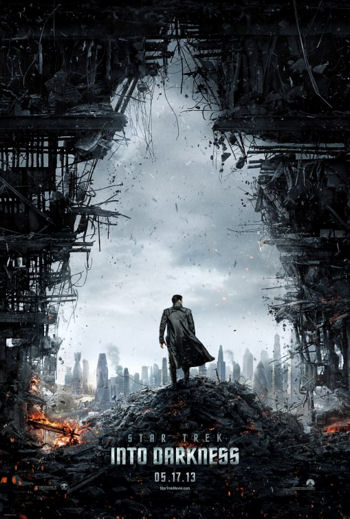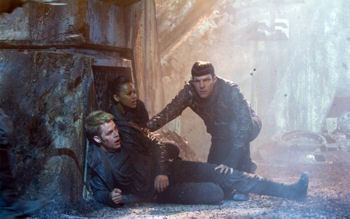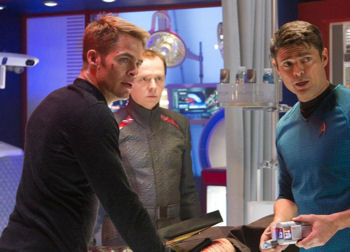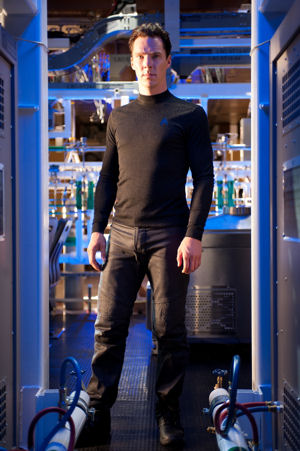 Star Trek Star Trek
Into Darkness
Warning: There are minor spoilers ahead that you've likely already been reading on the internet for the last two years.
Star Trek Into Darkness is arguably the best Star Trek movie ever made.
That's a carefully worded statement; don't judge it quite yet.
Looking back over the total of twelve Trek movies, there have been amazing highs and agonizing lows. There's even the curse of the Odd-Numbered-Star Trek-Movies: where fans believe that even numbered outings are uniformly superior to the odd numbered films. Fandom even renamed Star Trek the Motion Picture to Star Trek the Motionless Picture, harping on the long scenes where little action takes place. Still, there have been terrific highlights, First Contact, The Voyage Home, and of course The Wrath of Khan.
After the floundering of the initial motion picture, writer/director Nicolas Meyer and producer Harve Bennett breathed new life into the franchise by dipping back into the original TV series to bring a strong villain to play against Kirk, Spock and McCoy: Khan as played by Ricardo Montalban.
A fast-paced and witty script that dealt face-on with the crew's aging relationship, and repeated cheating of death. It sits at the top of Star Trek experiences, exploring and extending the character's growth, dealing with an amazing personal threat to the crew, and conveying a final message of hope while still in the shadow of the most a dramatic tragedy the series ever boldly portrayed.
 Wrath is beloved by Trekkers and casual viewers alike. Most have lost track of how many times they've watched it, and for those not already in love with the series and characters it's an oft-noted entry point to becoming a fan. Wrath is beloved by Trekkers and casual viewers alike. Most have lost track of how many times they've watched it, and for those not already in love with the series and characters it's an oft-noted entry point to becoming a fan.
So why did director JJ Abrams decide to try and knock it off that perch?
I have no idea. Actually, I do have an idea, I just don't have an answer.
Star Trek Into Darkness is the movie I feared Abrams would make after his Star Trek reboot. It was obvious. It was seductive. It was easy. Take all the best bits out of the most beloved Star Trek movie, mix it up with a slightly subdued amount of lens flare and a budget for special effects never approached in the pre-reboot films. Hell, it probably cost more than the first six films combined! Then bring in Benedict Cumberbatch as the villain, an accomplished actor whose fan following from the British Sherlock television show guaranteed a "oh, that's cool" response from fans. Mix well and serve.
It's as close to a guaranteed hit as you could construct. And on its own it delivers on every promise.
Star Trek Into Darkness brings us back to the USS Enterprise where Chris "Kirk" Pine and Zachary "Spock" Quinto continue their fledgling adventures. Some time has passed since their first outing, other missions are hinted at with names and races that long-time fans will recognize. In fact, we're guaranteed that first contact adventures with Tribbles and the Gorn are already in our past (see the recently released and definitely rushed videogame). But the crew is still fairly green, and the command crew not entirely at ease with each other.
 Quickly we learn that this Kirk will not get away with "bending" Star Fleet's non-interference Prime Directive, that ramifications for doing so can be harsh, and those people he thought he could count on to act in his defense might not do so as predicted. Kirk quickly loses almost everything gained in the first movie. Quickly we learn that this Kirk will not get away with "bending" Star Fleet's non-interference Prime Directive, that ramifications for doing so can be harsh, and those people he thought he could count on to act in his defense might not do so as predicted. Kirk quickly loses almost everything gained in the first movie.
But of course the plot intervenes at this point to shake up the status quo, and in no time Kirk finds himself back in the captain's chair. Both Kirk and the audience hardly have the time to learn to deal with the loss before that loss is reversed. And that is somewhat of a theme in this new universe.
From there it's a wild and twisty path of mystery, deception, revelation, and a ton of action. Eminently entertaining, with few points of calm, it's a very satisfying roller-coaster ride to the end. The special effects are flawless, the music epic, and the script is clever and well-paced. Sure there are some jumps in the logic of the plot, but we've learned to ignore that stuff when we're being so satisfyingly entertained.
But even with all that goodness, there's a problem with this new Star Trek Universe that's not been worked out yet.
In examining the big picture, or rather first two movies, we understand that Abram's Star Trek takes place in a universe where several significant things occurred differently. Some of these differences were in place before the events caused by Nero and Spock's entry from the original universe. Young Jim Kirk didn't grow up with his father's guidance; in fact his father died as Jim was being born. The moon of the Klingon home world is shattered in space very early in its conflict with the Federation. Uhura and Spock are "dating." The insertion of Spock Prime and Nero into the new universe led to the death of the planet Vulcan, but arguably that was not the event that caused this 'verse to divert from the original timeline events.
 Abrams has used this reboot as a license to rewrite The Wrath of Khan's elements into a new movie, which has a very different set of messages. Gone are the characters questioning themselves due to age and loss, and instead we have a simpler understanding of what friendship means. Twisted too the is action, the alpha-male head-butting between Kirk and Khan, which subtly was never expressed physically, eventually comes down to an all-out brawl between Khan and Spock. And the "oh my god you killed Spock!" not fully resolved for another two movies, comes down to McCoy delivering the note that someone was "only dead for a little while." Abrams has used this reboot as a license to rewrite The Wrath of Khan's elements into a new movie, which has a very different set of messages. Gone are the characters questioning themselves due to age and loss, and instead we have a simpler understanding of what friendship means. Twisted too the is action, the alpha-male head-butting between Kirk and Khan, which subtly was never expressed physically, eventually comes down to an all-out brawl between Khan and Spock. And the "oh my god you killed Spock!" not fully resolved for another two movies, comes down to McCoy delivering the note that someone was "only dead for a little while."
Still Abrams delivers on a number of levels that The Wrath of Khan never approached. We truly believe this new villain is physically and mentally superior to Kirk (note I didn't say luckier or trickier). The complexity of the story is more layered, a bigger and a more succulent mystery than the original; we're actively rethinking and questioning our assumptions about whether we have one or two villains in the movie, and what their plans really are.
There are some great quotes, especially due to the fact that Spock now has a girlfriend who can go toe-to-toe with him in a debate. Kirk is perhaps the one who gets the least rework; he's Shatner's Kirk who has apparently traded in some charisma for a tighter set of abs and better hair (the latter confirmed by Scotty by the way).
So, in the big evaluation, this is a movie for new Trek fans first. Abrams has said he never liked Star Trek growing up, there wasn't enough action, the "message" episodes didn't appeal. So he's fixed that. Yay.
The question is, could he have done so without rewriting what was undoubtedly the greatest Star Trek story ever told? Do we really get such a thrill out of seeing all the Easter egg references and unexpected "twists?" Sure, The Wrath of Khan itself "borrowed" from the original series by returning characters already experienced on the television show. But that movie sequel was completely fresh and new, and arguably without it the franchise would have died then and there.
Given all the promise of a newly unexplored universe for Kirk and crew to explore, it feels dually wrong to revisit a cherished story, one-up it on so many levels and ignore the potential of telling new stories. How much cooler would it have been to actually explore a first contact or war with the Klingons, or continue the story of the remaining Vulcan's establishing a new home, or…? The possibilities are literally endless.
But it's done. The movie is out there, and on its own is a terrific experience. To an aging fan group, it is ironically the best and worst of times. The epic struggle culminating with learning to accept mortality and loss has admittedly been traded for an action adventure that culminates with the christening of an epic bromance.
Hardcore fans can choose to feel betrayed, or to embrace this new young crew and the life it breathes into the franchise. We can get past the feelings of betrayal, we can insulate our memory from the loss, and like Kirk looking out on the Genesis planet, we can all tear up a little while we state defiantly that "we too feel young again." Star Trek Into Darkness is a great movie, and after all, you can still buy a terrific Blu-ray version of Star Trek: The Wrath of Khan on Amazon.
Let's just hope the next Star Trek movie doesn't deal with Kirk having to let Edith Keeler die.
|
 Star Trek
Star Trek Wrath is beloved by Trekkers and casual viewers alike. Most have lost track of how many times they've watched it, and for those not already in love with the series and characters it's an oft-noted entry point to becoming a fan.
Wrath is beloved by Trekkers and casual viewers alike. Most have lost track of how many times they've watched it, and for those not already in love with the series and characters it's an oft-noted entry point to becoming a fan. Quickly we learn that this Kirk will not get away with "bending" Star Fleet's non-interference Prime Directive, that ramifications for doing so can be harsh, and those people he thought he could count on to act in his defense might not do so as predicted. Kirk quickly loses almost everything gained in the first movie.
Quickly we learn that this Kirk will not get away with "bending" Star Fleet's non-interference Prime Directive, that ramifications for doing so can be harsh, and those people he thought he could count on to act in his defense might not do so as predicted. Kirk quickly loses almost everything gained in the first movie.  Abrams has used this reboot as a license to rewrite The Wrath of Khan's elements into a new movie, which has a very different set of messages. Gone are the characters questioning themselves due to age and loss, and instead we have a simpler understanding of what friendship means. Twisted too the is action, the alpha-male head-butting between Kirk and Khan, which subtly was never expressed physically, eventually comes down to an all-out brawl between Khan and Spock. And the "oh my god you killed Spock!" not fully resolved for another two movies, comes down to McCoy delivering the note that someone was "only dead for a little while."
Abrams has used this reboot as a license to rewrite The Wrath of Khan's elements into a new movie, which has a very different set of messages. Gone are the characters questioning themselves due to age and loss, and instead we have a simpler understanding of what friendship means. Twisted too the is action, the alpha-male head-butting between Kirk and Khan, which subtly was never expressed physically, eventually comes down to an all-out brawl between Khan and Spock. And the "oh my god you killed Spock!" not fully resolved for another two movies, comes down to McCoy delivering the note that someone was "only dead for a little while." 




